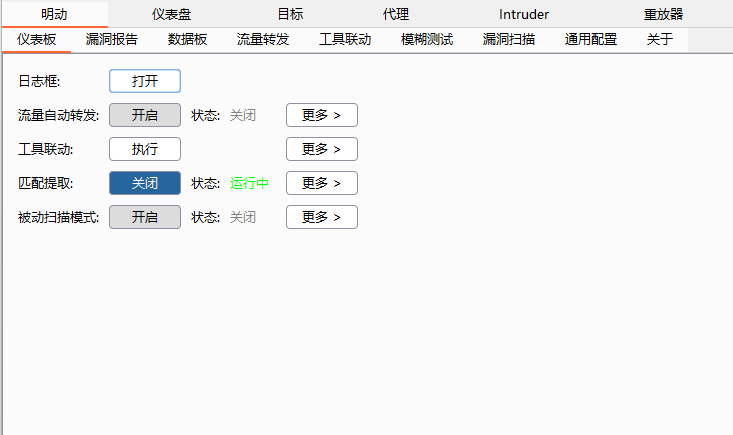脚本captcha-killer-modified
codereg.py
# -*- coding: utf-8 -*-
# @Time : 2024/4/19 19:25
# @Software: f0ng
import argparse
import ddddocr # 导入 ddddocr
from aiohttp import web
import base64
print(
"欢迎使用captcha-killer-modified服务端脚本,项目地址:https://github.com/f0ng/captcha-killer-modified\n谷歌reCaptcha验证码 / hCaptcha验证码 / funCaptcha验证码商业级识别接口:https://yescaptcha.com/i/bmHz3C\n\n")
parser = argparse.ArgumentParser()
parser.add_argument("-p", help="http port", default="8888")
args = parser.parse_args()
ocr = ddddocr.DdddOcr()
port = args.p
auth_base64 = "f0ngauth" # 可自定义auth认证
# 识别纯整数0-9
async def handle_cb00(request):
if request.headers.get('Authorization') != 'Basic ' + auth_base64:
return web.Response(text='Forbidden', status='403')
ocr.set_ranges(0)
img_base64 = await request.text()
img_bytes = base64.b64decode(img_base64)
# return web.Response(text=ocr.classification(img_bytes)[0:4]) 验证码取前四位
# return web.Response(text=ocr.classification(img_bytes)[0:4].replace("0","o")) 验证码取前四位、验证码中的0替换为o
res = ocr.classification(img_bytes,probability=True)
s = ""
for i in res['probability']:
s += res['charsets'][i.index(max(i))]
print(s)
return web.Response(text=s)
# 识别纯小写英文a-z
async def handle_cb01(request):
if request.headers.get('Authorization') != 'Basic ' + auth_base64:
return web.Response(text='Forbidden', status='403')
ocr.set_ranges(1)
img_base64 = await request.text()
img_bytes = base64.b64decode(img_base64)
# return web.Response(text=ocr.classification(img_bytes)[0:4]) 验证码取前四位
# return web.Response(text=ocr.classification(img_bytes)[0:4].replace("0","o")) 验证码取前四位、验证码中的0替换为o
res = ocr.classification(img_bytes,probability=True)
s = ""
for i in res['probability']:
s += res['charsets'][i.index(max(i))]
print(s)
return web.Response(text=s)
# 识别纯大写英文A-Z
async def handle_cb02(request):
if request.headers.get('Authorization') != 'Basic ' + auth_base64:
return web.Response(text='Forbidden', status='403')
ocr.set_ranges(2)
img_base64 = await request.text()
img_bytes = base64.b64decode(img_base64)
# return web.Response(text=ocr.classification(img_bytes)[0:4]) 验证码取前四位
# return web.Response(text=ocr.classification(img_bytes)[0:4].replace("0","o")) 验证码取前四位、验证码中的0替换为o
res = ocr.classification(img_bytes,probability=True)
s = ""
for i in res['probability']:
s += res['charsets'][i.index(max(i))]
print(s)
return web.Response(text=s)
# 识别小写英文a-z + 大写英文A-Z
async def handle_cb03(request):
if request.headers.get('Authorization') != 'Basic ' + auth_base64:
return web.Response(text='Forbidden', status='403')
ocr.set_ranges(3)
img_base64 = await request.text()
img_bytes = base64.b64decode(img_base64)
# return web.Response(text=ocr.classification(img_bytes)[0:4]) 验证码取前四位
# return web.Response(text=ocr.classification(img_bytes)[0:4].replace("0","o")) 验证码取前四位、验证码中的0替换为o
res = ocr.classification(img_bytes,probability=True)
s = ""
for i in res['probability']:
s += res['charsets'][i.index(max(i))]
print(s)
return web.Response(text=s)
# 识别小写英文a-z + 整数0-9
async def handle_cb04(request):
if request.headers.get('Authorization') != 'Basic ' + auth_base64:
return web.Response(text='Forbidden', status='403')
ocr.set_ranges(4)
img_base64 = await request.text()
img_bytes = base64.b64decode(img_base64)
# return web.Response(text=ocr.classification(img_bytes)[0:4]) 验证码取前四位
# return web.Response(text=ocr.classification(img_bytes)[0:4].replace("0","o")) 验证码取前四位、验证码中的0替换为o
res = ocr.classification(img_bytes,probability=True)
s = ""
for i in res['probability']:
s += res['charsets'][i.index(max(i))]
print(s)
return web.Response(text=s)
# 识别大写英文A-Z + 整数0-9
async def handle_cb05(request):
if request.headers.get('Authorization') != 'Basic ' + auth_base64:
return web.Response(text='Forbidden', status='403')
ocr.set_ranges(5)
img_base64 = await request.text()
img_bytes = base64.b64decode(img_base64)
# return web.Response(text=ocr.classification(img_bytes)[0:4]) 验证码取前四位
# return web.Response(text=ocr.classification(img_bytes)[0:4].replace("0","o")) 验证码取前四位、验证码中的0替换为o
res = ocr.classification(img_bytes,probability=True)
s = ""
for i in res['probability']:
s += res['charsets'][i.index(max(i))]
print(s)
return web.Response(text=s)
# 识别小写英文a-z + 大写英文A-Z + 整数0-9
async def handle_cb06(request):
if request.headers.get('Authorization') != 'Basic ' + auth_base64:
return web.Response(text='Forbidden', status='403')
ocr.set_ranges(6)
img_base64 = await request.text()
img_bytes = base64.b64decode(img_base64)
# return web.Response(text=ocr.classification(img_bytes)[0:4]) 验证码取前四位
# return web.Response(text=ocr.classification(img_bytes)[0:4].replace("0","o")) 验证码取前四位、验证码中的0替换为o
res = ocr.classification(img_bytes,probability=True)
s = ""
for i in res['probability']:
s += res['charsets'][i.index(max(i))]
print(s)
return web.Response(text=s)
# 识别自定义字符,默认为识别算术
async def handle_cb000(request):
if request.headers.get('Authorization') != 'Basic ' + auth_base64:
return web.Response(text='Forbidden', status='403')
ocr.set_ranges(request.headers.get('ranges'))
print(request.headers.get('ranges'))
img_base64 = await request.text()
img_bytes = base64.b64decode(img_base64)
# return web.Response(text=ocr.classification(img_bytes)[0:4]) 验证码取前四位
# return web.Response(text=ocr.classification(img_bytes)[0:4].replace("0","o")) 验证码取前四位、验证码中的0替换为o
res = ocr.classification(img_bytes,probability=True)
s = ""
for i in res['probability']:
s += res['charsets'][i.index(max(i))]
print(s)
if '+' in s:
zhi = int(s.split('+')[0]) + int(s.split('+')[1][:-1])
print(zhi)
return web.Response(text=str(zhi))
elif '-' in s:
zhi = int(s.split('-')[0]) - int(s.split('-')[1][:-1])
print(zhi)
return web.Response(text=str(zhi))
elif '*' in s:
zhi = int(s.split('*')[0]) * int(s.split('*')[1][:-1])
print(zhi)
return web.Response(text=str(zhi))
elif 'x' in s:
zhi = int(s.split('x')[0]) * int(s.split('x')[1][:-1])
print(zhi)
return web.Response(text=str(zhi))
elif '/' in s:
zhi = int(s.split('/')[0]) / int(s.split('/')[1][:-1])
return web.Response(text=str(zhi))
else:
return web.Response(text=s)
# 识别常规验证码
async def handle_cb2(request):
if request.headers.get('Authorization') != 'Basic ' + auth_base64:
return web.Response(text='Forbidden', status='403')
# print(await request.text())
img_base64 = await request.text()
img_bytes = base64.b64decode(img_base64)
# return web.Response(text=ocr.classification(img_bytes)[0:4]) 验证码取前四位
# return web.Response(text=ocr.classification(img_bytes)[0:4].replace("0","o")) 验证码取前四位、验证码中的0替换为o
res = ocr.classification(img_bytes)
print(res)
return web.Response(text=ocr.classification(img_bytes)[0:10])
# 识别算术验证码
async def handle_cb(request):
zhi = ""
if request.headers.get('Authorization') != 'Basic ' + auth_base64:
return web.Response(text='Forbidden', status='403')
# print(await request.text())
img_base64 = await request.text()
img_bytes = base64.b64decode(img_base64)
res = ocr.classification(img_bytes).replace("=", "").replace("?", "")
print(res)
if '+' in res:
zhi = int(res.split('+')[0]) + int(res.split('+')[1][:-1])
print(zhi)
return web.Response(text=str(zhi))
elif '-' in res:
zhi = int(res.split('-')[0]) - int(res.split('-')[1][:-1])
print(zhi)
return web.Response(text=str(zhi))
elif '*' in res:
zhi = int(res.split('*')[0]) * int(res.split('*')[1][:-1])
print(zhi)
return web.Response(text=str(zhi))
elif 'x' in res:
zhi = int(res.split('x')[0]) * int(res.split('x')[1][:-1])
print(zhi)
return web.Response(text=str(zhi))
elif '/' in res:
zhi = int(res.split('/')[0]) / int(res.split('/')[1][:-1])
return web.Response(text=str(zhi))
else:
return web.Response(text=res)
app = web.Application()
app.add_routes([
web.post('/reg2', handle_cb), # 识别算数验证码
web.post('/reg', handle_cb2), # 识别常规验证码
web.post('/reg00', handle_cb00), # 识别纯整数0-9
web.post('/reg01', handle_cb01), # 识别纯小写英文a-z
web.post('/reg02', handle_cb02), # 识别纯大写英文A-Z
web.post('/reg03', handle_cb03), # 识别小写英文a-z + 大写英文A-Z
web.post('/reg04', handle_cb04), # 识别小写英文a-z + 整数0-9
web.post('/reg05', handle_cb05), # 识别大写英文A-Z + 整数0-9
web.post('/reg06', handle_cb06), # 识别小写英文a-z + 大写英文A-Z + 整数0-9
web.post('/reg000', handle_cb000), # 识别自定义
])
if __name__ == '__main__':
web.run_app(app, port=int(port))自行确认验证码的位数及格式,对代码进行修改
burp插件
参考文章
Security】利用Burp Suite爆破带有验证码Web登录接口(保姆级教程)
Windowsburpsutie爆破自动识别验证码(亲测)
burp验证码爆破插件二改
文章里写的很详细,不多赘述。
© 版权声明
文章版权归作者所有,未经允许请勿转载。
THE END









 会员专属
会员专属


请登录后查看评论内容